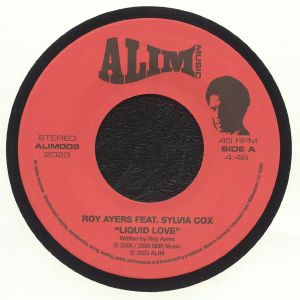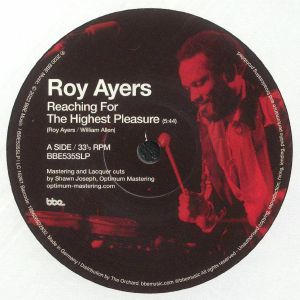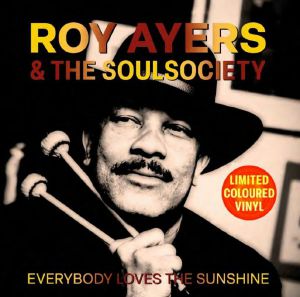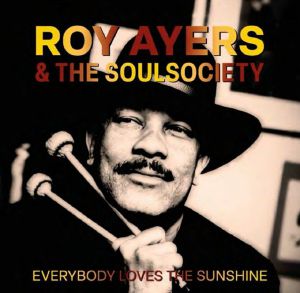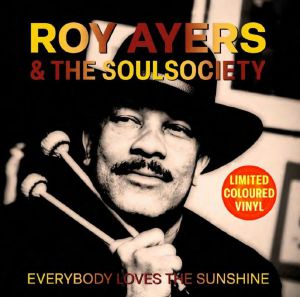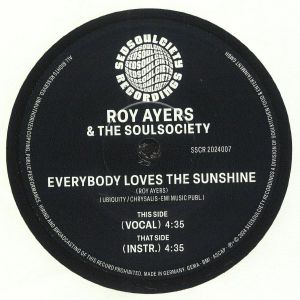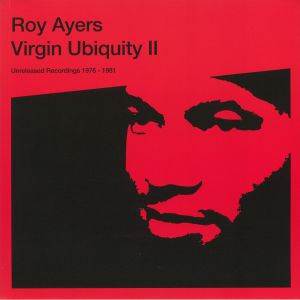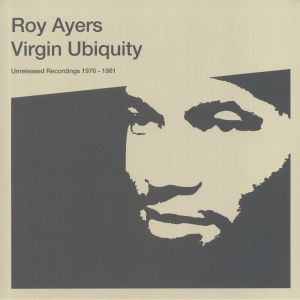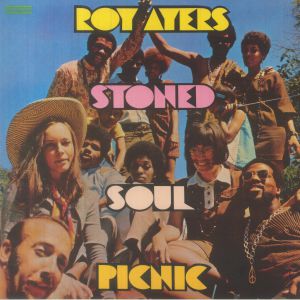Back catalogue: All genres
Juno's full catalogue of All genres
シングル
Review: With both tracks now coming out for the first time on 7" vinyl, the 'Liquid Love' and 'What's The T?' 7" single is a must get for all Roy Ayers fans and serious music collectors, not least as 2023 witnesses Roy's final ever tour of live dates. This release is a fitting tribute to the career of one of the most influential musicians in global Black music history and each track represents his virtuosity as a vibesman and his versatility across genres. 'Liquid Love' is taken from the 2015 BBE released album of Roy's unreleased material, Virgin Ubiquity II and is a wicked mid-tempo track where Roy's vibraphone complements an amazing female vocal arrangement to create harmonies and melody over a tough-as-you-like breakbeat, bassline and keyboard riff.
… Read more in stock $17.65
Review: Roy Ayers staked a bold claim by flaunting the fact that he had 'Reach[ed] The Highest Pleasure' back in June '77. Unfortunately for us back then, this lifetime hedonistic milestone - documented in instrumental funk form - was shelved for reasons unknown beyond simple artistic oversight. As said, this slick solo instrumental for drums, bass and vibraphone is a perfect soul-jazz, chillout trifecta, one for the rarities collectors.
… Read morePlayed by: * Record Breakin' Music *, Juno Recommends Jazz
in stock $20.73
Everybody Loves The Sunshine (remastered) (translucent orange vinyl 7" limited to 300 copies)
Cat: SSCRART 007 ORANGE. Rel: 09 May 25
Funk
Review: This orange 7" is a miniature monument to one of soul's most quietly influential figures. Roy AyersiLos Angeles-born, jazz-schooled, funk-mindedicrafted 'Everybody Loves the Sunshine' not to dazzle but to dissolve. It moves with a drowsy clarity: shimmering synth, near-whispered vocals, and a lazily tumbling bassline that never quite lands. Released during a golden run of Ayers' mid-70s material, the track has since become shorthand for warm-weather introspection, equal parts ease and ache. The instrumental version on the reverse keeps the spirit intact, offering a meditative glide through the same terrain. Limited to 300 copies, this orange pressing pairs a low-lit groove with a deepening sense of legacyiAyers' influence isn't just heard, it's felt in the space he leaves behind.
… Read morePlayed by: Mukatsuku Records Chart
in stock $17.92
Cat: SSCRART 007 BLACK. Rel: 09 May 25
Funk
Review: Few recordings capture the easy intensity of a summer afternoon like 'Everybody Loves the Sunshine'. Released in 1976 and wrapped in slow-drifting synths and soft falsettos, the track became a touchstone not just for Roy Ayers, but for 70s soul and beyond. Born in Los Angeles, Ayers helped define the jazz-funk crossover, placing the vibraphone at the centre of a sound both hazy and sharply detailed. The original vocal take on the A-side still melts under its own warmth; the instrumental on the flip uncovers the careful architecture beneath. Issued here on 7" black wax following Ayers' recent passing, this reissue feels like both a keepsake and a quiet honouring of an artist who shaped a whole way of listening.
… Read more in stock $17.92
Everybody Loves The Sunshine (remastered) (translucent yellow vinyl 7" limited to 300 copies)
Cat: SSCRART 007 YELLOW. Rel: 09 May 25
Funk
Review: Roy Ayers at his most transcendent. 'Everybody Loves the Sunshine' is more than a summertime anthemiit's a spiritual moodboard that's shaped jazz-funk, soul, r&b and hip-hop for nearly 50 years. Ayers, born in Los Angeles and raised in its fertile fusion scene, places the vibraphone at the music's heart, coaxing heat-haze tones from sparse chords, synths, and that honeyed chorus. Flip it over and the instrumental version unlocks a deeper layer: stripped of vocals, it becomes a pure groove, drifting and hypnotic. What lingers is the balanceibetween melancholy and bliss, rhythm and release. A rare track that feels entirely unhurried yet quietly radical, now preserved in a limited pressing that looks as golden as it sounds.
… Read more in stock $17.92
Cat: SSCR 2024007. Rel: 22 Apr 24
Funk
Review: 'Everybody Loves the Sunshine' represents a pivotal moment for Roy Ayers and Ubiquity, marking a departure towards a funkier and more laid-back sound in 1976. With its languid tempo and dreamy atmosphere, captures the essence of summer with its joyful lyrics and hypnotic groove. Ayers' vibraphone melodies intertwine seamlessly with the band's instrumentation, creating a mesmerizing sonic landscape that resonates with listeners. The song's universal appeal lies in its ability to evoke a sense of warmth and nostalgia, making it a timeless classic that continues to enchant audiences across generations.
… Read more in stock $18.20
アルバム
Virgin Ubiquity II: Unreleased Recordings 1976-1981 (gatefold 3xLP)
Cat: BBE 537ALP. Rel: 24 Mar 20
Funk
Review: This is the second part of Virgin Ubiquity: Unreleased Recordings 1976-1981and is again packed with tracks that are far more than unreleased findings from the cutting room floor. Each one serves as another feather in the bow of the virtuoso Ayers, who combined jazz, funk, soul and disco in magical and unique ways throughout his career. In doing so he laid down a precursor to acid jazz and hip hop. These are tracks that show off his dynamic, liquid rhythm sections and mellifluous keys, as well as the vocal talents of a range of collaborators who touch on soaring and sensuous highs as well as more gravel and earthy lows. Essential.
… Read more in stock $41.45
Review: The legendary Roy Ayers has a wealth of great material to his name but Virgin Ubiquity: Unreleased Recordings 1976-1981 might just be the cream of the crop. It's packed with gold that fuses soul and funk, jazz and disco into a load of killer cuts that never got their own release. There are husky vocal tracks featuring Merry Clayton on "Oh What A Lonely Feeling," "I Really Love You" and "What's the T?", sensual soul stirrers from Carla Vaughn such as "Mystic Voyage" and "Together Forever" and of course liquid synths and rhythm sections underpinning each of the tracks.
… Read more in stock $26.61
Review: Roy Ayers' 1968 jazz opus Stoned Soul Picnic might be less beloved or revered by fans of the vibraphonist, but it is nevertheless a deeply affecting slice of jazz mindfulness and fittingly contrasting mood, consisting entirely of covers of songs by the likes of Laura Nyro ('Stoned Soul Picnic', after which the album takes its namesake), Charles Tolliver ('Lil's Paradise') and Edwin Birdsong ('What The People Say'). We now hear a full-quality reissue via Nature Sounds.
… Read more in stock $26.06

 USD
USD






